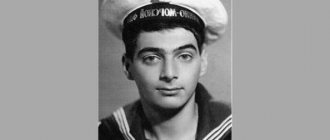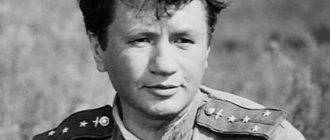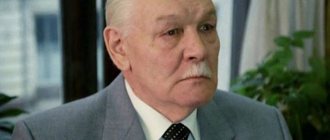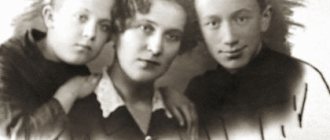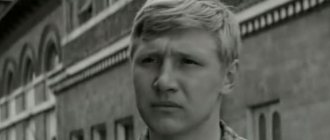The childhood of Rolan Bykov
Rolan Antonovich Bykov was born on October 12, 1929 in the city of Kyiv.
Father Semyon Konstantinovich Gordanovsky was a Pole by birth, a Red Army soldier, and a participant in the First World War. During the war he was captured in Austria, from where he escaped. Later, Semyon Konstantinovich took a pseudonym - Anton Mikhailovich Bykov. Mother Olga Matveevna Sitnyakovskaya was Jewish by nationality. Roland Bykov received his name in honor of the French writer Romain Rolland; my mother mistakenly decided that Rolland was his name. Roland had an older brother, Herman. After the war, Roland's father studied at the military academy, from which he was expelled due to a conflict with his superiors. Then he worked as director of a sheep-breeding state farm in Turkmenistan. Later he moved with his wife to Kyiv, where they had a son, Roland. At the end of the 30s, the Bykovs moved to Moscow. Here, since 1939, Roland studied at the Rodnik theater studio in the House of Pioneers.
“Furious Rolan Bykov” After the outbreak of World War II, Rolan’s father volunteered for the front, and the family moved to Yoshkar-Ola for evacuation. Roland's grandmother practiced fortune telling with cards. After watching her do it, the boy decided to try his hand at this too. He told his neighbor that in three days her husband would return from the war. The prediction came true and visitors flocked to the little fortuneteller. Soon Roland's fees became the main family income.
In the winter of 1943, the family returned to Moscow. As a result of numerous fortune-telling sessions, Roland began to have nervous attacks, as a result of which he ended up in a psychiatric hospital named after Kashchenko.
"Scarecrow"
Bykov’s creative path was by no means cloudless. His works were often subjected to severe criticism. Especially the movie "Scarecrow". The film, which tells about child cruelty, caused mixed reviews.
One day Zheleznikov’s book “Scarecrow” fell into the hands of Pasha Sanaev. He read this story, then told his mother about it, and she told Rolan Antonovich. Bykov spent the whole night reading Zheleznikov’s work. And in the morning I decided to make a film based on it.
This picture cost the director dearly. The censors insisted on removing many shots from the film. A real struggle began, ending in Bykov's victory. The film was released in 1983. This is the penultimate directorial work of Rolan Bykov.
The beginning of the acting career of Rolan Bykov
After graduating from school in 1947, Roland decided to become an actor.
He tried to enter the Moscow Art Theater and VGIK, but did not pass the exams. GITIS did not accept him because of his short stature. The last option remained - the Shchukin Theater School, where he was accepted. During his studies at the school, Roland played about fifty roles. In 1951, Bykov graduated from the Shchukin School and became an actor at the Moscow Theater for Young Spectators. On the theater stage he played more than forty roles. The actor's wages were small, 33 rubles 50 kopecks, and Roland began to earn extra money. He led a Sunday drama club and for four monthly classes he earned twice as much as in the theater. Soon he came up with the idea of creating his own theater. In 1957, Bykov opened the amateur Student Theater at Moscow State University without official permission. At that time, such arbitrariness could have landed you in prison, but Roland relied on the lack of coordination between the actions of various authorities: “I decided that I would somehow get through: the Central Committee would think that the Moscow City Committee had authorized it, the Moscow City Committee would think that this was the Komsomol’s business, the Komsomol would blame it on the trade unions.” ... The main thing is that Yablochkina cuts the red ribbon!” And so it happened, the famous actress took part in the opening of the theater and, with the help of scissors, legitimized its existence.
Rolan Bykov brilliantly played the cat Basilio
The MSU Student Theater quickly became a full member of the Moscow theater world. In 1958, Bykov staged the play “Such Love” at the theater, which was a huge success. In the same year, Rolan Antonovich was invited to the Lenkom Theater in Leningrad to take the position of chief director. At Lenkom he managed to assemble a talented team and stage several brilliant performances that were a success with the public. However, after the first success, the theater troupe was overcome by “star fever” and intrigue began within the group. Bykov's relationship with the staff did not work out, and he decided to leave the theater.
"Bury Me Behind the Baseboard"
By the time Bykov met Sanaeva, he had already become notorious in cinematic circles. Elena's parents, of course, have heard more than once that her new boyfriend is a frivolous man who drinks heavily. In addition, he was 14 years older than her. Vsevolod Sanaev categorically did not want to see Rolan Bykov as his son-in-law.
Until the age of ten, Pasha, Elena’s son, was raised by his grandparents. They did their best to incite their grandson against Bykov. They called Rolan Antonovich nothing more than a “bloodsucker dwarf.” The boy believed that this terrible man would sooner or later poison his mother.
Bykov more than once suggested that Elena take her son and live together. But it was difficult to do this. Firstly, they spent most of their time filming. Secondly, it was difficult for Elena to resist the authority of her parents.
Pavel realized that his stepfather was not so scary only on the set of the film “Scarecrow.” Elena Sanaeva played a teacher in this film. Pasha is the only protector of the main character.
Film work
Rolan Bykov began acting in films in the mid-50s.
He played his first role in 1954, appearing in the film “School of Courage” as a realist guy. The following year, Bykov played the role of Stepan, nicknamed Peretz, in the film “Pedagogical Poem” and research assistant Vinnik in the film “Paths and Fates.” Later there were roles in the films “It Started Like This” (Vasya Lapshin), “Our Correspondent” (Nikolai Uvarov). In 1959, Rolan Bykov, the latest jokes. Bykov played Akaki Akakievich Bashmachkin in the film “The Overcoat”, this was his first significant role in cinema. Since 1960, Rolan Bykov worked as an actor and director at the Mosfilm film studio. Of the roles he subsequently played, the most famous are: a passerby in the park in the film “I’m Walking Through Moscow”, policeman Terek (“We’re Calling Fire on Ourselves”), Chebakov (“The Marriage of Balzaminov”), trumpeter Kolpakov (“They’re Ringing, Open the Door”), buffoon (“Andrei Rublev”), Red Army soldier Ivan Karyakin (“Two Comrades Served”), monk Johannes (“The Last Relic”).
Bykov and Sanaeva
It would be difficult to imagine a stranger couple. A young, beautiful actress, the daughter of a famous artist and a drinking and conflicted Bykov. Many considered him a failure. Not a single actor has played in as many banned films as Rolan Bykov.
Elena didn’t listen to anyone: neither her colleagues nor her parents. She loved and was loved. Not everything went well in their life. There was a period when Bykov was not allowed to film. He began to drink heavily, and Elena pulled him out of all sorts of troubles every time. And she, of course, was by his side when he became seriously ill.
They lived in a civil marriage for 13 years. After a heart attack, Rolan Antonovich realized that it was urgent to legalize the relationship. Otherwise, when he leaves, Elena and Pavel will be left with nothing.
Many considered him a ladies' man, but he was a one-woman man. Once Rolan Bykov said to his wife: “God invented you and sent you to me.”
Directing by Rolan Bykov
In 1962, Rolan Bykov released his debut directorial work, the comedy “Seven Nannies.”
The next year, the comedy “Summer Is Lost” was released, co-authored with N.V. Orlov. This film won one of the main prizes in the youth competition at the Cannes Film Festival. In 1966, the musical feature film “Aibolit-66” was released, based on the works of Korney Chukovsky. This eccentric comedy became a serious step in the development of comedy cinema, and the name of director Bykov after the film’s release became a symbol of children’s cinema. Rolan Antonovich himself played the role of Barmaley in the film, which became one of the most striking in his artistic biography.
Rolan Bykov was convincing in the role of Barmaley
Bykov’s next children’s film was “Attention, Turtle!” 1970 - about how schoolchildren saved a turtle from under the tracks of a tank. In this film, Bykov played the roles of grandmother Didenko and grandmother Manukyan. At the International Film Festival of Children's Films in Moscow in 1971, the film received the main prize.
In 1974, Rolan Bykov directed the film “A Car, a Violin and a Dog Blob”, in which he played several roles at once. After the release of this film, Bykov began to deservedly be considered one of the best directors of children's films, to which he decided to devote his life. As an actor, Bykov continued filming in quite adult films, from which we can highlight: “Commissar” (1967), “Dead Season” (1968), “Road Check” (1971), “Big Change” (1972), “12 chairs" (1977).
It was hard for Rolan Antonovich to work on the drama film “Scarecrow,” released in 1984. The director had to overcome resistance from various authorities. In 1986, the film was awarded the USSR State Prize. This work became the pinnacle of the director's creativity.
Personal life
The personal life of Rolan Bykov was closely connected with creativity. The director was married twice. The master’s first wife is actress Lydia Knyazeva, known for her role as the monkey Chi-Chi in the fairy tale “Aibolit 66”. Lydia became the only representative of the drag queen role to be awarded the title of People's Artist of the USSR. The couple did not have their own children, and the couple adopted the boy Oleg. The adopted son outlived Rolan Antonovich by only four years.
Elena Sanaev and Rolan Bykov
Bykov entered into a second marriage with actress Elena Sanaeva, with whom he created the acting duet of the cat Basilio and the fox Alice in the children's film “The Adventures of Pinocchio.” Elena had a son, Pavel, from a previous relationship, and Roland raised his stepson as his own child.
Now Pavel is engaged in cinematography. Like his stepfather, the young man became interested in directing. Pavel is known to viewers for his films “Kaunas Blues”, “Last Weekend”, “Kilometer Zero”, “At the Game”. Based on the book by Pavel Sanaev, “Bury Me Behind the Baseboard,” a drama of the same name was filmed with Svetlana Kryuchkova, Maria Shukshina, and Alexei Petrenko in the lead roles.
The last years of Rolan Bykov's life
Since the mid-1980s, Rolan Bykov has been involved in production and management activities, and was the head of the Yunost association at the Mosfilm film studio.
During the years of perestroika, Bykov performed various administrative, public and creative duties. He served as secretary of the Union of Cinematographers, was president of the International Foundation for the Development of Film and Television for Children and Youth, was an honorary professor at Moscow State University, a member of the Council of the General Assembly on Children's Cinema at UNESCO, and a people's deputy of the USSR from 1989 to 1991. He was the president of Help Bank. In 1995, together with Vladimir Dzhanibekov and Irina Khakamada, he headed the “Common Cause” electoral bloc in the elections to the State Duma. By the mid-90s, Rolan Antonovich was seriously ill; he had lung cancer. In early 1996, he underwent lung surgery, after which he lived for just over two years. On October 6, 1998, Rolan Bykov died in the hospital. He was buried in Moscow at the Novodevichy cemetery.
Love
Andrey Rublev (1966−1969)
In the 50s, Rolan Bykov married for the first time - to actress Lydia Knyazeva. The lovers really wanted a child, but it was impossible to have a baby. Desperate, they adopted a boy named Oleg.
Bykov lived in his first marriage for 15 years. And then his life began to change rapidly - first, popularity and bags of letters from women in love, lying in full view of his wife, and then failures and even drunkenness brought the Bykov family to disintegration. A completely strange woman came to the rescue of a man who was rapidly sinking to the bottom.
With Elena Sanaeva, the daughter of the famous artist Vsevolod Sanaev, they were supposed to fly to Leningrad for filming. Bykov openly stated that he does not like such “fifas” and “daddy’s daughters”, for whom everything in life is arranged thanks to their parents. But the director gave him FIFA’s phone number and told him to sort out organizational issues.
He called to ask when they were flying out so that they could arrive in Leningrad together and not delay filming. But she just snorted that planes were not for her, she would arrive by train. He didn't like the tone. Having appeared on the set first, he immediately began to persuade the director to change the actress. And he was already beginning to think when Sanaeva burst into the pavilion and smashed the conspirators, leaving the role for herself.
Elena Vsevolodovna seemed to Bykov to be an unearthly beauty. He immediately backed down and even began to court the girl.
The romance between Bykov and Sanaeva did not begin for a long time. They got along hard. During the time the lovers were getting acquainted, divorces occurred in both families. In parallel with this, Bykov began to have troubles on the professional field. Scenarios were not agreed upon, ideas were killed in the bud. Rolan Antonovich began to drink.
During one of his drinking bouts, Knyazeva did not allow him to go home. The proud actor never returned.
Links
- Rolan Bykov (English) on the Internet Movie Database website
- Article by Yan Levchenko for the anniversary of Rolan Bykov
- Rolan Bykov, biography as presented by F. Razzakov
- Rolan Bykov on kinopoisk.ru
- Rolan Bykov on the Kino-Theater website. RU
Notification
: The preliminary basis for this article was a similar article in https://ru.wikipedia.org, under the terms of CC-BY-SA, https://creativecommons.org/licenses/by-sa/3.0, which was subsequently modified, corrected and edited.
Source - “https://www.jearc.info/wiki/%D0%91%D1%8B%D0%BA%D0%BE%D0%B2,_%D0%A0%D0%BE%D0%BB% D0%B0%D0%BD_%D0%90%D0%BD%D1%82%D0%BE%D0%BD%D0%BE%D0%B2%D0%B8%D1%87"
Categories: Personalities in alphabetical order | Wikipedia: Articles about filmmakers without portraits | Jews in the USSR | Movie
Hidden categories: Wikipedia articles | Blackberry:Articles with unfinished sections
Content
- 1 Biography 1.1 Early years
- 1.2 Theater and cinema
- 1.3 Later years
- 3.1 Roles in the theater 3.1.1 Moscow Youth Theater
